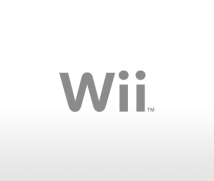5. Make it 120% Zelda!
So, how did the interviews with the staff go? Did they tell you all sorts of awful stories about me?
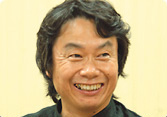
You knew you were quite welcome to join us! But in the end you decided not to come along.
I thought they’d find it easier to speak without me there. I did want to hear what they had to say though.
You missed some really interesting stuff! There were lots of different points of view about your “upending of the tea table.”1 (laughs) Some people said that this time nothing like that happened, while others disagreed and said that one by one all the plates and bowls were overturned, and before they knew it everything had been changed! (laughs) 1This is a reference to the classic Japanese comic and animated series, Hoshi of the Giants. The father in the series once upended the tea table when the family was eating their meal there. Shigeru Miyamoto's working style has been compared to this because of his tendency to make last-minute suggestions that leave everyone else scrambling to implement them before the deadline.
I don’t think I did any table-upending this time around, did I Aonuma-san?
Hmmm… Let me see… (laughs)
Perhaps you didn’t do it as aggressively as Ittetsu Hoshi2, but a lot of people said that in the end they realised that everything had been overturned without them realising it was happening! (laughs) 2Ittetsu Hoshi is the name of the strict father in Hoshi of the Giants.
That’s right, this time you did your upending in a slightly more considerate manner.
No, this time everyone did their jobs so well that I only had to do a bit of rearranging.
There you go again! (laughs)
What you mean is that instead of upending the table, you just rearranged the plates? (laughs)
That’s it! Just a bit of rearranging! You know, let’s put the rice here, and the side dishes over here…
Well, everyone has their own interpretation of things. People like me who are well used to Miyamoto-san didn't bother resisting.
Some of the staff were saying that it was more like a game of Reversi, with you overturning all of the pieces one by one…
Ah, Reversi! Well yes, I guess it was a bit like that. But I didn’t really overturn anything. To me, “overturning” would mean coming out with something like: “Actually, Link was a woman all along!” (laughs)
Oh, don't be ridiculous! (laughs)
“The best way to resolve this would be to make Link into a woman!” That kind of thing… (laughs) I didn’t do anything like that!
You're right, there was nothing like that. (Noticing demo screens from Twilight Princess) Did you play Zelda on Wii during the interviews?
That’s right. I got the developers to show me their favourite scenes from the game. Unfortunately, most of them we couldn’t reveal to the public yet! (laughs)
This is the final version, right? Ah yes, it is. I’m glad it's the right one!
We were making changes right up to the end, weren’t we? (laughs)
This is a good opportunity to discuss the start-up time for the game. From turning on the console to actually playing Zelda, how long does it take in the final version?
Well, when you start Wii, a screen showing you how to hold the remote, and health and safety warning screens appear. It takes time to read those, so it’s not easy to give the precise number of seconds it takes. But I can say that it feels as if the game begins quickly. Shall we give it a go? Particularly with the expansion in the memory of game consoles these days, it’s become natural to expect a lengthy loading time, but we didn’t want to use this as an excuse, so we tried to make sure the games would load quickly.
If you insert the Game Disc after switching on the console, it takes a little time to recognise the disc. But if you switch off the console with the disc still inserted, it will start up faster the next time you want to play.
Yes, I'd like users to notice all the efforts the staff have made, for instance in speeding up the time that the player can get back into the game, using Flash Memory.
I really get the sense of it starting up smoothly. But ever since we settled on the development concept for Wii, the two of us have constantly stressed to the development team that we should be aiming for a three second load-up time. We haven't got there yet though, have we?
Not yet. It takes longer than I thought it would to go from the Channels to the Wii Menu, or from one Channel to another. It bothers me a bit that it's slower than the time it takes to flick between channels on a TV. I really want to get working on making everything faster when the system is updated. But even now, when you compare it to the load-up time on a computer, it's extremely fast, but I'm still not completely satisfied. If we could just get it even a little closer to the speed of flicking between channels on a TV...
Yes, I'm particularly concerned about the time it takes to return to the Wii Menu. As Wii has a function which allows the system to be updated both through the Internet or disc media, so even the customers who buy the Wii early on will always be able to have it updated.
But even with things as they are at present, there aren't many devices that can launch a web browser from the time the power is switched on as quickly as Wii does.
How about the time it takes to read data during games?
It depends on what's going on in the game at a given point, but it takes roughly between two and four seconds to go from one scene to the next. Once you've actually started the game, it's all very smooth. Wii Sports and Wii Play are both especially good on that score.
With Zelda, there are absolutely no scenes which need anything like a loading bar on-screen. If we had needed something like that, I would have made it but as it turned out, it wasn't necessary.
That's good news. I think fans will be very glad to hear that. Okay, let's start the interview proper. Thank you both for joining me.
It's my pleasure.
I'm actually a bit nervous! (laughs)
Normally, I get everyone to introduce themselves at the start, but that is hardly necessary for the two of you! (laughs) Eiji Aonuma-san, you worked as the director on The Legend of Zelda: Twilight Princess and Shigeru Miyamoto-san, you were the producer. Let's begin with you, Aonuma-san. What was the starting point on Twilight Princess?
The initial theme I had in mind was naturally to make the first realistic Zelda since Ocarina of Time. But I didn't dive in with only that aim in mind. I wanted to shake up the Zelda concept a little. That's why early on, I brought up the suggestion that this time Link should transform into a wolf. I really felt that we needed a new twist of some sort. As for why I chose a wolf, it really was simply what occurred to me at the time. My intention was for it to just be one suggestion to get the ball rolling when we were discussing what kind of things we might do. I was curious as to how seriously everyone would take it. That's what I was thinking when I threw the idea out there: "This time, let's make him into a wolf!" Miyamoto-san really gave me a piece of his mind after that! (laughs) I remember him telling me: "It's a lot harder to make a four-legged animal than it is to make a two-legged human, you know!" (laughs)
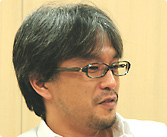
If you compare what you had in mind then with the final product we have today, what are the biggest differences?
Well, as you can imagine, I had no idea it would turn into such an enormous project.
You mean you didn't intend it to grow to be quite this size?
At the very least, at the start I didn't envisage the project expanding to the scale it eventually did. But it seems that in the minds of the staff, they wanted to make a very big Zelda, and as development continued, the project grew and grew. At one point, in the middle of development, I actually thought: "This is getting a bit out of hand." I made various attempts to rein in the project, but when something has developed naturally to that size, it becomes somewhat difficult to apply the brakes. At that point, all we could do was fill in the space by cramming it full of more fun elements for the player to enjoy. We kept adding more and more to the game, but the size caused a lot of trouble, right up to the end. Of course, this is not a bad thing, and in the end it has become a Zelda game which has retained a sense of proportion. It's undeniably big, but I believe all those fun elements which make up this world justify this size. Now that we have finished, I feel that with a generation accustomed to watching epic films like Lord of the Rings, when you want to design a convincing world that sort of vast scale becomes necessary. But it's a fact that putting it all together was a challenge, and I sensed how much I still had to learn as a director.
But the final product has been put together successfully?
Absolutely. I can say that we made a Zelda that we can present to the world with real confidence. But to accomplish that, I had to get a lot of people to lend me a hand.
So you called on the expertise of Miyamoto-san yet again?
I certainly did! (laughs) I tried to make sure that everything was neatly arranged on top of the tea table for him. (laughs) But as the project grew, unexpected problems started manifesting themselves in unexpected forms, and it became impossible to handle each and every one of them. When Miyamoto-san began fixing various problems, there were plenty of cases where I thought: "I wanted to fix that, but didn't have the time..." But when it came to getting the game into its final form, it is precisely because so many people lent their assistance to the project that I think we have really come up with something special. I am entirely satisfied with how that part of the process went.
The release of Twilight Princess was postponed by a year from the originally planned date, wasn't it? That was actually the very first time I have ever suggested to Miyamoto-san that we delay the release of a game by a year! (laughs) I was very aware that it would be a real challenge to complete the project on time, but most of all I knew we had to do everything to ensure that this would be our masterpiece, the greatest Zelda of all time.
One of your key phrases was that this should be "120% Zelda", wasn't it?
I did say that, didn't I? (laughs) If you forced me to tell you precisely what was 100% Zelda and what was 120% Zelda, I would struggle to answer, but basically I wanted us to make the best Zelda ever. So as well as coming out with slightly unreasonable demands like "Make it 120% Zelda!", I also made the proposal to delay the release by a year. Aonuma-san, how did you react to that delay?
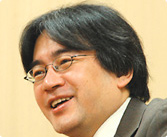
I really felt bad for all the fans who were waiting for the game, but to be completely honest I was grateful for it. At the time the decision to postpone the release date was taken, we had an abundance of really interesting material for the game but we hadn't finished tying it all together. Of course there were parts of the game that were complete but there were also lots of places which simply weren't yet playable at that time.
When you showed that playable version at E3, I saw just how many great elements were in the game but that they were still in a state of disarray. You faced a big challenge bringing them all together, didn't you?
Right. For that reason, I was very grateful for the extra year. I don't know how the other staff reacted to the news though. Perhaps they felt that even though they had worked so hard, they still had another year to go. But I think that in order to fully realise everything they had come up with, that extra time was vital.
Well, I have asked a total of twelve members of staff about this, and without exception they have said that they were glad about the postponement.
Is that right? That's a relief! (laughs)
Of course, it wouldn't be true to say that everyone was looking forward to another year of such demanding work. Also, there were some who said that if the release date was going to be changed, it would've been better to inform everyone of this earlier. But even those people thought it was a good idea.
Ah, I see. But it was really tough, with or without the postponement of the release date. The demand to "Make it 120% Zelda!" is really not an exaggeration, if you think about the level of expectation the fans have. As we have to produce something that lives up to those expectations, simply giving ourselves longer to do it is not in itself something to be pleased about.
Miyamoto-san, when the decision to postpone the game's release was made, how did you feel about the Zelda game as it was at that point?
I thought it was enjoyable, but that it was really a long way from being ready! (laughs) When I thought about where we needed to focus our attention in the time we had left, my head started spinning.
(Embarrassed laugh) But that was exactly the state things were in.
Now, a year down the line, it's actually a surprise that it's such a solidly put-together game. In fact, until I came to interview all of the developers, I had imagined that a game of the quality and size of Zelda would be produced with strict orders being handed down from above. Without that, I thought that a project of this scale wouldn't come together. But listening to everyone, it seemed that contrary to what I had thought, everyone came up with their own individual ideas for the game. It seems that somehow everyone had their own conception of what the essence of Zelda was, even if this wasn't expressed in words. Using that nebulous idea as a sort of filter, it is the final fusing together of these individual ideas that gives the game its final form. That's one thing to do with twenty or thirty people, but when you're talking about a huge project with over seventy people, it's incredible to think that this process worked. Aonuma-san, what do you think?
I absolutely agree with you on that. The idea of what defines the essence of Zelda becomes the most important thing. That is really the only absolutely fundamental criterion which we can then use to build on. But as you said, that isn't something which is clearly defined. Personally, I can't put into words what the essence of Zelda is, and while I know that I should be able to, I still couldn't give you a clear definition.
Don't worry. Over the course of these interviews, I've been asking everyone what makes a game "Zelda-esque". As you can imagine, the answers have been somewhat confused, and no one has really been able to define it perfectly. But having said that, it is absolutely clear that there is something that resembles a set of values that is common to everyone who worked on the project.
I think that's true. After all, without that we wouldn't have been able to make the game. I'm not talking about a set formula, but I do think that if clear guidelines existed, I might be able to say "Make Zelda like this!" and the game would be developed in line with those instructions. But there is absolutely nothing like that, and Zelda games simply can't be made in that way.
Putting together a "How to Make Zelda" guide would be inconceivable.
Absolutely inconceivable. All that we can say to the staff during development are things along the lines of: "Well, we've racked our brains and come up with all the Zelda games this far, so keep that in mind, and keep racking your brains!" (laughs) In that sense, it is possible to give the staff the freedom to get on with developing the game. Needless to say, that doesn't mean I simply left everything to them. Our role is to let the young staff on each of the Zelda projects come up with their own ideas, without being overly influenced by previous Zelda titles, then take those ideas and make them work successfully within the context of the game. But at the end, the more experienced developers have to tighten the screws, so to speak, so all the elements in the game fit together. Without experience, it's extremely difficult to gauge things like how far to let the staff work freely on their own ideas, or how to put the game together in a way that will appeal to the user. It's quite easy to keep coming up with ideas, and expanding the size of the game. It's another thing to decide how best to connect those ideas. As Miyamoto-san often says, that is the part you really need to develop "a feel" for.
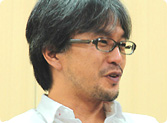
I see… Miyamoto-san, when you're asked what defines Zelda how do you normally respond? Can you give a definite answer?
Sure. For me, what makes a game "Zelda-esque" is actually much the same as what makes a game "Mario-esque".
And what might that be?
